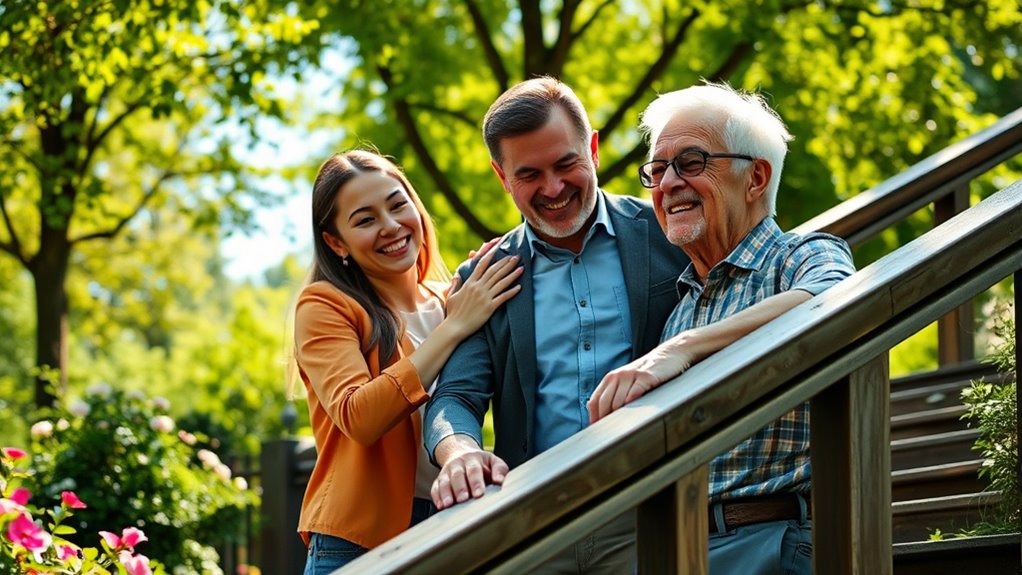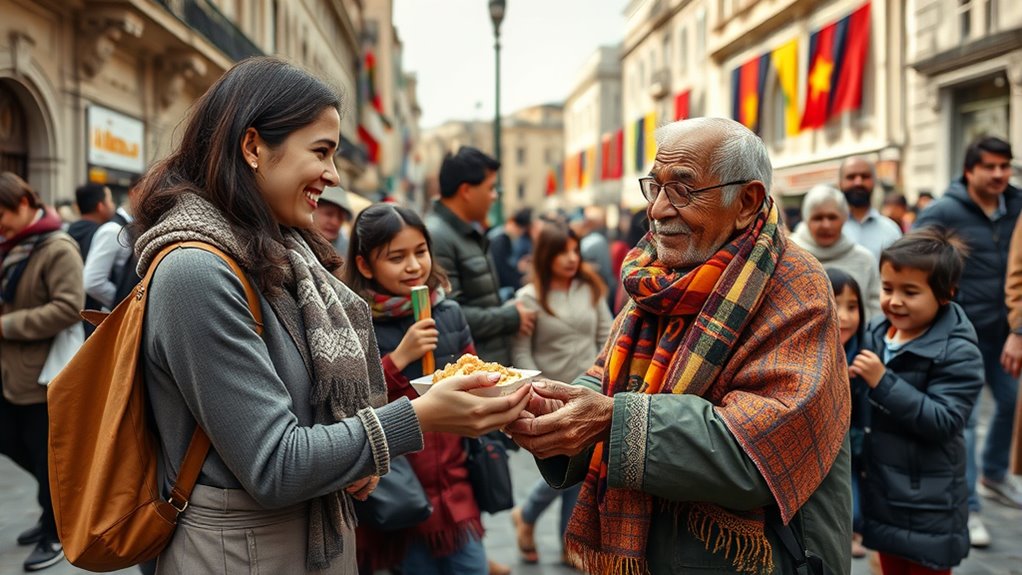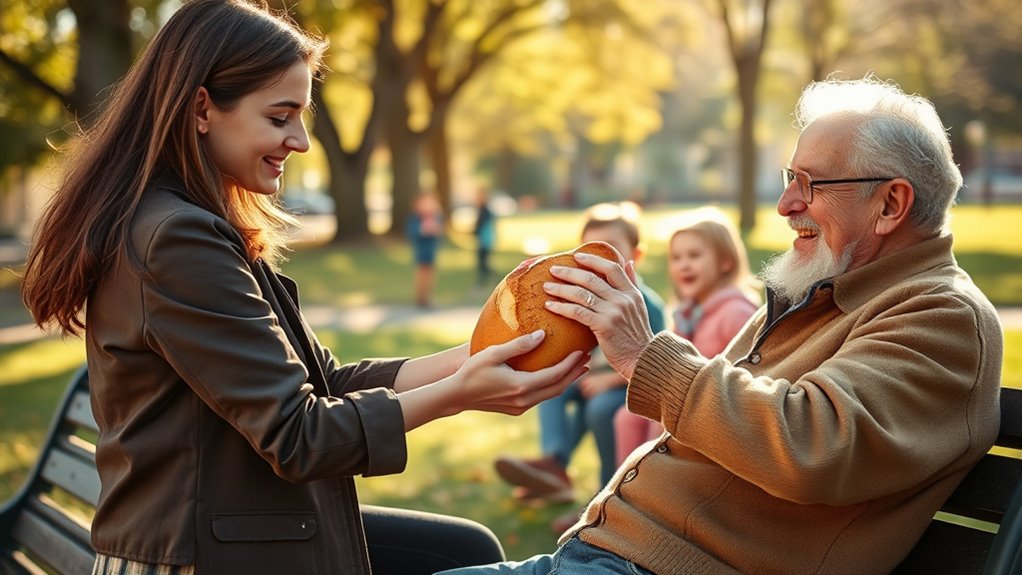When you perform random acts of kindness, your brain releases feel-good chemicals like dopamine and oxytocin, boosting your happiness and strengthening social bonds. Acts driven by empathy activate your brain’s reward pathways and encourage neuroplasticity, making you more resilient and emotionallyconnected. Mirror neurons help you truly understand others’ feelings, reinforcing genuine kindness. Over time, these behaviors enhance your mental well-being and social skills. Continue exploring, and you’ll discover how kindness rewires your brain for lasting emotional benefits.
Key Takeaways
- Random acts of kindness activate the brain’s reward system, releasing dopamine and oxytocin, which reinforce positive feelings and social bonds.
- Engaging in spontaneous kindness fosters neuroplasticity, strengthening neural pathways related to empathy, emotional regulation, and social connection.
- Such acts enhance emotional well-being by reducing stress, boosting mood, and promoting feelings of trust and safety within communities.
- Performing unexpected kindness triggers mirror neurons, helping individuals internally simulate others’ emotions and deepen empathetic understanding.
- Regularly practicing random kindness creates a positive feedback loop, improving social cohesion, resilience, and overall mental health.
The Neurochemical Rewards of Kindness

When you perform a kind act, your brain releases a surge of feel-good chemicals that reinforce the behavior. This process involves neurotransmitter release within your reward circuitry, which signals pleasure and satisfaction. When you help someone or show compassion, your brain’s reward system lights up, similar to receiving a reward for other positive actions. These neurochemical responses, like the release of dopamine and oxytocin, create a sense of happiness and connection. This not only makes you feel good in the moment but also encourages you to repeat kind behaviors in the future. Fundamentally, your brain is wired to reward kindness, making generosity feel naturally gratifying and self-reinforcing. This neurochemical feedback loop explains why kindness is often contagious and rewarding. Additionally, understanding these neurochemical processes can help motivate us to cultivate more kindness in our daily lives. Recognizing the role of these reward pathways can further motivate us to perform acts of kindness regularly, as they are deeply rooted in our brain’s natural pleasure systems.
How Empathy Drives Generosity

When you feel empathy for someone, it sparks a desire to help that person, often leading to generous actions. Your emotional connection makes you more motivated to act selflessly. This link between empathy and generosity shows how understanding others fuels kindness. Recognizing the importance of user privacy and data protection can also influence how we approach acts of kindness in digital spaces. Additionally, understanding the architectural needs of a space can foster a sense of community and shared empathy. Engaging in practices that strengthen positive thinking can further amplify our capacity for compassion and generosity. Moreover, being aware of Kia Tuning options demonstrates how intentional improvements can enhance overall well-being and satisfaction.
Empathy Sparks Altruism
Empathy acts as a powerful catalyst that fuels altruistic behavior, prompting you to act generously without expecting personal gain. When you genuinely understand others’ feelings, your emotional resilience strengthens, allowing you to respond compassionately even in challenging situations. This deep emotional connection supports moral development, guiding you to prioritize kindness over self-interest. As your capacity for empathy grows, so does your motivation to help others, driven by a sincere desire to ease their suffering. This emotional awareness fosters a sense of shared humanity, making altruistic acts feel natural rather than obligatory. Understanding the cycle of breakups can also deepen your empathy, helping you approach others’ relationship struggles with compassion. Additionally, increased awareness of data privacy challenges highlights the importance of respecting others’ boundaries and personal information. Developing emotional intelligence can further enhance your ability to interpret and respond to others’ feelings accurately. Recognizing the importance of empathy in social bonds helps reinforce your commitment to kindness, strengthening your connections with others. Ultimately, empathy transforms your willingness to give into an authentic expression of understanding, igniting spontaneous acts of kindness that benefit both others and your own emotional well-being.
Emotional Connection Motivates
Understanding others’ emotions creates a powerful emotional connection that motivates you to act generously. When you genuinely empathize, you feel connected and want to help. This emotional connection fuels the motivation behind kindness, making your actions more authentic and impactful. To see how this works, consider the following factors:
| Feeling Recognized | Empathy Sparks Action | Building Trust |
|---|---|---|
| Emotional awareness | Compassion drives giving | Strengthening bonds |
| Shared experiences | Motivation behind kindness | Encourages reciprocity |
| Understanding needs | Acts of kindness deepen bonds | Promotes social cohesion |
| Emotional resonance | Empathy as a catalyst | Fosters community |
| Recognizing protective styling benefits can further enhance your understanding of how shared values foster empathy. |
This table highlights how emotional connection directly influences the motivation behind kindness, inspiring genuine generosity. Additionally, engaging in acts like supporting sustainable energy projects can deepen your understanding of how shared values foster empathy. Recognizing emotional resonance in others can also enhance your ability to forge meaningful connections and promote a compassionate society.
The Social Bonding Effect of Helping Others

When you help others, you strengthen your social connections and create a sense of community. These acts build trust and foster empathy, making relationships more meaningful. By giving, you not only support others but also deepen the bonds that hold us together. Additionally, engaging in acts of kindness can boost your own mental well-being and promote a positive outlook through emotional benefits. Practicing kindness regularly can also contribute to developing a more mindful living attitude, which supports responsible and sustainable interactions within your community. Recognizing the importance of relationship dynamics can further enhance your understanding of how kindness influences social bonds and how noticing angel numbers in daily life may serve as subtle messages encouraging compassionate actions.
Strengthening Social Connections
Helping others can profoundly strengthen social bonds, fostering a sense of trust and mutual support. When you engage in acts of kindness, you create a network of social support that boosts emotional resilience in both you and others. This connection encourages open communication and shared experiences, making relationships more meaningful. To enhance these bonds, consider:
- Volunteering regularly to meet new people and deepen existing relationships
- Offering genuine encouragement during tough times
- Listening actively and showing empathy in conversations
- Celebrating others’ successes to build trust and camaraderie
- Practicing emotional regulation to manage your reactions and foster positive interactions
These actions reinforce your social connections, making them more resilient in challenging moments. By helping, you not only uplift others but also strengthen the foundation for lasting, supportive relationships.
Building Trust and Empathy
Building trust and empathy are essential for deepening social bonds, as they foster a sense of safety and mutual understanding. When you engage in acts of kindness, you promote trust development by showing genuine concern, which encourages others to open up. Developing emotional intelligence helps you recognize and respond to others’ feelings, strengthening empathy. As you practice helping others, your ability to read social cues improves, creating a cycle of positive interactions. This mutual understanding builds a foundation of reliability and compassion, making your relationships more resilient. Trust and empathy grow when you consistently demonstrate kindness, reinforcing the social bonds that connect you to others. Ultimately, nurturing these qualities enhances your capacity for meaningful connections and fosters a supportive community.
Altruism and Its Evolutionary Roots

Altruism, the selfless concern for the well-being of others, has long intrigued scientists and psychologists alike. You might wonder why you sometimes act kindly without expecting anything in return. Evolutionary survival partly explains this. It’s rooted in kin selection, where helping relatives ensures your genes survive. This behavior benefits your genetic line, even if it doesn’t directly serve your interests.
Altruism stems from kin selection, promoting genetic survival through helping relatives.
Consider these key points:
- Altruism boosts group survival, making communities stronger.
- Helping kin enhances the chances of shared genes passing on.
- Evolution favors behaviors that increase inclusive fitness.
- Random acts of kindness may stem from deep-seated evolutionary instincts.
Understanding this helps clarify why kindness feels so natural and essential for human evolution.
The Impact of Kindness on Brain Plasticity

When you engage in acts of kindness, your brain undergoes meaningful changes that enhance its flexibility and adaptability. This process, known as neuroplasticity enhancement, allows your brain to form new connections and strengthen existing ones. Kindness stimulates the release of neurotransmitters like dopamine and oxytocin, which promote positive feelings and reinforce compassionate behavior. Over time, these neural changes increase your cognitive flexibility, making it easier to adapt to new situations and view challenges from different perspectives. Regular acts of kindness don’t just benefit others—they actively reshape your brain, fostering resilience and emotional regulation. As your neural pathways adapt, you become more open-minded, empathetic, and capable of responding thoughtfully to life’s complexities. This illustrates how kindness can truly transform your brain’s structure and function.
Cultural Influences on Compassionate Behavior

Your cultural background shapes how you express kindness, influencing norms around generosity and altruism. These societal values foster a sense of collective identity that encourages compassionate acts. Additionally, societal rewards, like praise or social approval, motivate people to act kindly within their communities.
Cultural Norms Shape Generosity
Cultural norms deeply influence how people perceive and practice generosity. Your society’s values and social expectations shape what’s considered appropriate giving. These norms can encourage or discourage acts of kindness based on shared beliefs. For example:
- In some cultures, giving to family is prioritized over strangers.
- Social expectations may dictate public displays of generosity as a sign of respect.
- Cultural taboos can limit certain types of giving or sharing.
- Community-oriented societies often promote collective acts of kindness.
Understanding these influences helps you see that generosity isn’t just personal—it’s embedded in cultural standards. When you recognize how cultural norms shape behaviors, you can better appreciate why people act kindly in different contexts and how social expectations guide your own giving.
Collective Identity and Altruism
Shared identities within a community often foster a sense of belonging that motivates you to act with compassion. When you see yourself as part of a group—whether based on culture, nationality, or shared values—you’re more likely to engage in altruistic behaviors that benefit others. This group identity strengthens social cohesion, making acts of kindness feel like contributions to a collective well-being. You may feel a sense of responsibility or pride in supporting your community, which fuels your willingness to help strangers or neighbors. The stronger your connection to the group, the more motivated you are to act in ways that uphold its values and promote harmony. Ultimately, collective identity reinforces altruism by aligning individual actions with the group’s shared purpose.
Societal Rewards Influence Behavior
Societal rewards play a significant role in shaping how people behave with compassion, as cultures often establish norms that encourage altruistic actions. When societal expectations reward kindness—like praise, social acceptance, or recognition—you’re more likely to act compassionately. These rewards influence your personal motivations, making kindness feel valuable and worthwhile.
Consider these examples:
- Receiving gratitude boosts your sense of fulfillment.
- Public acknowledgment encourages repeat acts of kindness.
- Social approval reinforces compassionate behavior.
- Cultural norms create a sense of duty to help others.
The Role of Mirror Neurons in Empathy

Mirror neurons play a crucial role in how you experience empathy by enabling you to internally simulate the emotions and actions of others. When you observe someone expressing happiness, sadness, or pain, these neurons activate in your brain as if you were experiencing those feelings yourself. This neural mechanism is fundamental to empathy development because it helps you understand and share others’ emotional states effortlessly. By mirroring what you see, your brain creates a sense of connection, making social interactions more meaningful. This automatic response fosters compassion and understanding, encouraging you to act kindly. Essentially, mirror neurons form the biological foundation for your ability to genuinely relate to and empathize with those around you, driving compassionate and altruistic behaviors.
How Random Acts of Kindness Improve Mental Well-being

Engaging in random acts of kindness can considerably boost your mental well-being by fostering positive emotions and reducing stress. When you practice self-compassion and mindful giving, you create a sense of connection and purpose that uplifts your mood. These acts can lead to lasting feelings of satisfaction and resilience.
Here are four ways kindness improves your mental health:
- Increases dopamine and serotonin, boosting your mood.
- Reduces cortisol, helping you manage stress better.
- Strengthens social bonds, decreasing feelings of loneliness.
- Promotes self-awareness and compassion, fostering a healthier mindset.
The Psychological Benefits of Giving and Receiving

Giving and receiving acts of kindness can create powerful psychological benefits by fostering a sense of connection and purpose. When you practice gratitude exercises, you shift your focus to appreciating what you have, boosting positive emotions and reducing stress. Similarly, compassion meditation helps you cultivate empathy, enhancing your emotional resilience and deepening your sense of belonging. Both activities encourage a mindful awareness of kindness, which can lead to increased feelings of happiness and fulfillment. When you give, you often experience an uplift in mood and a stronger sense of social connection. Receiving kindness, in turn, reinforces feelings of trust and acceptance. Together, these practices promote a cycle of positivity that benefits your mental well-being and emotional health.
Strategies to Cultivate Kindness in Daily Life

Practicing gratitude and compassion not only benefits your emotional well-being but also offers practical ways to incorporate kindness into everyday routines. You can start by integrating mindfulness practices, which help you stay present and aware of others’ needs. Additionally, gratitude journaling encourages you to reflect on positive experiences and recognize acts of kindness around you. To cultivate kindness daily, consider these strategies:
- Dedicate a few minutes each day to mindfulness practices, focusing on compassion.
- Keep a gratitude journal, noting moments when someone showed kindness.
- Perform small acts of kindness spontaneously, like offering a compliment.
- Set daily intentions to be more empathetic and attentive to others’ feelings.
These habits strengthen your capacity for kindness and foster a more compassionate mindset.
Frequently Asked Questions
Can Random Acts of Kindness Influence Long-Term Personality Traits?
You might wonder if random acts of kindness can shape your personality over time. They can, because they promote neuroplasticity development and empathy cultivation. When you consistently practice kindness, your brain rewires itself, strengthening compassionate tendencies and emotional awareness. This ongoing process can lead to lasting changes in your personality, making you more empathetic and socially connected, showing that small acts can have profound, long-term impacts on who you are.
How Do Personality Differences Affect the Likelihood of Performing Kind Acts?
Personality traits greatly influence how likely you are to perform kind acts. If you’re naturally empathetic or extraverted, you’re more motivated by social connection and compassion, making kind gestures more common. Conversely, if you’re more introverted or cautious, you might perform kind acts less frequently. Your motivational factors, driven by your personality, shape your willingness to engage in kindness, reinforcing positive social behaviors over time.
What Role Does Childhood Upbringing Play in Kindness Behaviors?
Your childhood upbringing influences how you behave today, especially through parenting styles and early socialization. If you experienced nurturing parenting, you’re more likely to show kindness, as those behaviors were reinforced early on. Conversely, neglectful or strict parenting might make kindness less automatic. Early socialization teaches you how to connect with others, shaping your empathy and willingness to perform acts of kindness throughout your life.
Do Cultural Norms Impact the Frequency of Kindness in Different Societies?
Isn’t it ironic how cultural norms often dictate kindness, making it seem like social conformity rather than genuine compassion? You might find that in some societies, strict cultural expectations encourage frequent acts of kindness, while others see it as optional. So, yes, cultural norms heavily impact how often kindness is expressed, shaping behaviors based on societal rules rather than authentic empathy. It’s a fascinating dance between tradition and genuine human connection.
How Does Individual Mood Influence the Motivation to Engage in Kindness?
Your emotional state plays a big role in your motivation triggers for kindness. When you’re feeling happy or fulfilled, you’re more likely to want to help others, driven by positive emotions. Conversely, if you’re upset or stressed, your motivation to be kind may decrease. Your mood influences how you perceive social interactions, making you more or less inclined to act kindly based on your current emotional state.
Conclusion
Understanding the science behind kindness shows it’s more than just good manners — it’s wired into your brain. When you perform random acts of kindness, you activate neurochemicals that boost your mood and strengthen social bonds. Studies suggest that helping others not only benefits them but also enhances your mental well-being. So, go ahead, embrace kindness daily; it’s a powerful, scientifically supported way to improve your life and those around you.









